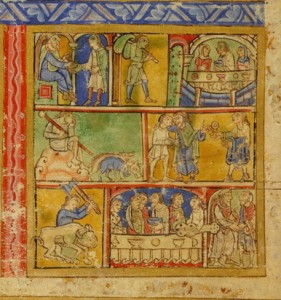What is Mercy?
On December 8, 2015 Pope Francis called the Church and the World to a Year of Mercy. This virtue is very prominent in the Pope’s preaching and teaching. Many have embraced this call; but, what is mercy?
Mercy is the attitude or action of someone who could justifiably be uninvolved, superior, insensitive or disdainful. It implies that the person extending mercy goes out of her or his way to ignore whatever differences there may be between the self and others. Sincere mercy is expressed by a person who has moved beyond self-preoccupation or fear to equanimity and even magnanimity. Mercy is inclusive. There is no judgment in mercy as to who deserves it or not. Mercy knows that the one extending mercy also needs it.
In the Hebrew Scriptures, “hesed” and “rachamim” are both translated as mercy. “Hesed” is a holy, giving love. It is a love which reaches out. It is a love that is steadfast and dependable. (Joshua 2:12-14) “Rachamim” comes from “racham” which is a mother’s womb. (1 Kings 3:26) This is a love that is tender, compassionate, and responsive.
Mercy in Jesus’ Life
Jesus spoke of mercy often. His life often called him to go beyond the law, the rules, and social norms. He pulled to himself those who were unacceptable — the dirty, leprous and sinful: outcasts, women, the old. The widow of Nain, Matthew and Zacchaeus (tax collectors), the woman with the constant bleeding, the man born blind, the woman caught in adultery, and the Samaritan woman at the well — all are examples of Jesus’ extending mercy and often incurring the wrath of the respectable authorities. Jesus crossed the gaps of separation between people to demonstrate the joy of unity. The parable of the prodigal Son is a wonderful example of this. Jesus showed us that fear of the other is unnecessary and destructive of authentic humanity. Mercy’s goal is happiness rather than just legal fairness. Doing mercy is helping people flourish. This is much more than just not hindering people. Jesus let us know that we all need each other’s mercy — and God’s most of all.
Jesus also offered mercy to the powerful. He had openness to the Scribes and Pharisees and encouraged dialogue as long as they were civil. But they could not imagine engaging with someone who associated with outcasts, nor that they themselves might need mercy. These authorities saw the perfect following of their laws as a sign of their righteousness and their separation from outcasts as a good thing. (Never mind that the poor did not have the finances to do the symbolic washing, eating, dressing, tithes, rituals, and travel to be perfectly observant,) Jesus was looking at the heart and its intentions. The elite enjoyed power coming from superiority and were looking at appearances
Mercy in the New Testament and Today
In the New Testament one can also find “eleos” translated as mercy. The root of “eleos” is “oil that is poured out.” Thus God’s love is poured out to us. The generosity of God’s care fills the Scriptures. It is one of St. Paul’s themes. ( Romans 5:5, Titus 3:6 and 1 Timothy 1:14) God’s mercy does not imply that God is weak. It does say that God knows well our circumstances and His love overflows for us.
Many people have experienced God’s mercy for them. In the most trying circumstances there are those who have leaned on God and found much solace and help. It is not easy to hit a wall and trust God. Coming up against those in power when they show no mercy is also a difficult, if not frightening thing.
In recent years those like Bishop Oscar Romero of El Salvador, Mother Teresa of Kolkata, and Dorothy Day in the United States have shown amazing humility and mercy. The examples of their lives speak to us as we deal with the challenges of our times and the call to give and receive mercy.










